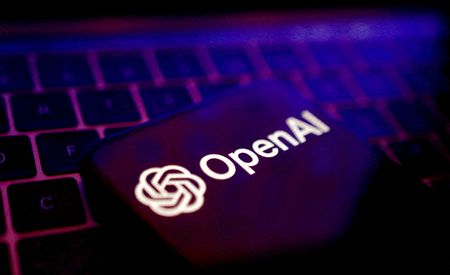By Krystal Hu, Arsheeya Bajwa and Aditya Soni
(Reuters) -OpenAI said on Monday it would remain under the control of its nonprofit parent, while pushing ahead with plans to change the structure of its for-profit arm to allow more capital-raising to keep pace in the artificial-intelligence race.
The announcement follows a storm of criticism and legal challenges, including a high-profile lawsuit filed by rival Elon Musk, who has accused the company of straying from its founding mission to develop AI for the benefit of humanity.
“We made the decision for the nonprofit to stay in control after hearing from civic leaders and having discussions with the offices of the Attorneys General of California and Delaware,” the startup said in a blog post. It added that it would work with major backer Microsoft, regulators and newly appointed nonprofit commissioners to finalize the updated plan.
The company had outlined plans in December to revamp its structure to become a public benefit corporation, saying that would help it to “raise more capital than we’d imagined,” and remove the restrictions imposed on the startup by its current nonprofit parent.
The move had raised concerns about whether OpenAI would allocate its assets to the nonprofit arm fairly, and how the company would strike a balance between making a profit and generating social and public good as it develops AI.
On Monday, OpenAI said the nonprofit parent will control the public benefit corporation and become a big shareholder in it.
Nonprofits are created to serve the public good, while public benefit corporations typically offer more flexibility to pursue profit alongside social goals.
Bret Taylor, chairman of OpenAI’s board, said Monday’s announcement means the startup will continue to have a structure “extremely close” to the current one.
CEO Sam Altman described it as a compromise “that (works) well enough for investors that they’re happy to continue to fund us to a degree we think we will need.”
As the expensive pursuit of artificial general intelligence, or AI that surpasses human intelligence, heats up, OpenAI has been looking to make changes to attract further investment.
It said in March it would raise up to $40 billion in a new funding round led by SoftBank Group, at a $300 billion valuation. The round was contingent on the AI firm transitioning to for-profit status by the end of the year.
SoftBank and Microsoft did not immediately respond to requests for comment.
Some analysts said the move could hamper the startup’s ability to raise capital as aggressively as it could have without the nonprofit control.
“The nonprofit status significantly reduces OpenAI’s ability to raise capital, as investors would want to be able to generate a return on their investment, which is considerably harder if a non-profit controls a commercial entity,” said Gil Luria, analyst at D.A. Davidson.
OpenAI’s structure drew attention in November 2023 during one of the biggest boardroom dramas in Silicon Valley, where members of the nonprofit board ousted Altman over a breakdown in communication and loss of trust. He was reinstated after five days, following an outpouring of support from employees and investors.
(Reporting Krystal Hu in New York, Aditya Soni and Arsheeya Bajwa in Bengaluru and Anna Tong in San Franciso; Editing by Alan Barona and Matthew Lewis)








